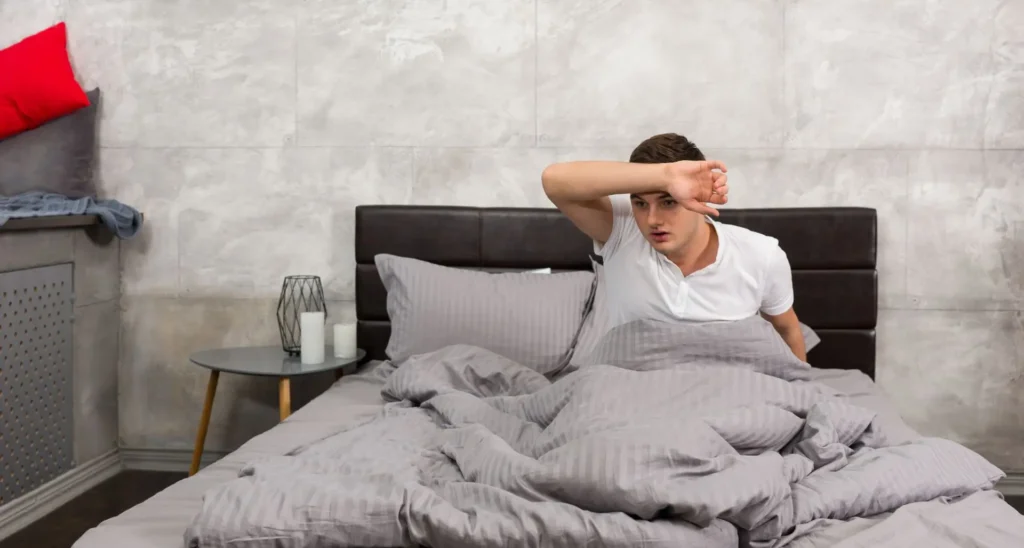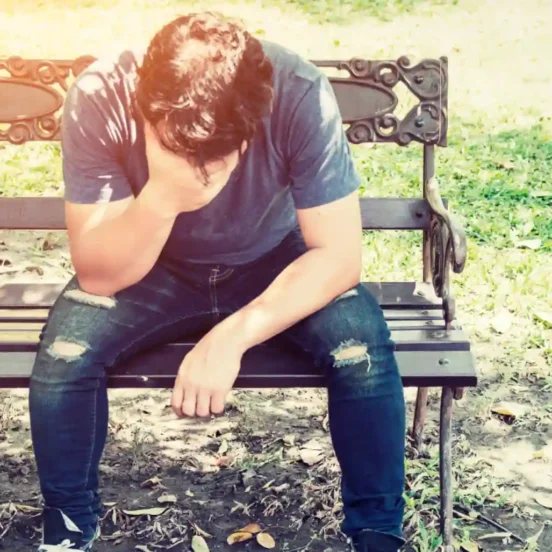Anxiety at Night: causes and Coping Strategies
Anxiety at night is a common phenomenon that affects millions of people worldwide. It’s characterized by feelings of worry, unease, and apprehension, often occurring or intensifying during the nighttime hours. For many individuals, the quietness and stillness of the night can amplify anxious thoughts, making it challenging to relax and fall asleep.
Whether triggered by daily stressors, specific anxieties, or underlying mental health conditions, experiencing anxiety at night can disrupt sleep patterns and impact overall well-being.
Understanding the causes and coping strategies for nighttime anxiety is essential for managing symptoms and promoting restful sleep.
Why Do I Get Anxiety at Night?
Understanding why anxiety tends to rear its head at night requires delving into various factors that contribute to this phenomenon. Firstly, nighttime often signifies the end of the day, a time when individuals are left alone with their thoughts and worries without the distractions of daytime activities.
Additionally, hormonal fluctuations throughout the day can play a role, with cortisol levels typically decreasing in the evening, leaving some individuals more susceptible to anxious thoughts. Moreover, unresolved stressors from the day or anticipation of future events can manifest as heightened anxiety when the mind is not preoccupied with tasks.
Furthermore, underlying mental health conditions such as generalized anxiety disorder or panic disorder may also contribute to nighttime anxiety. Understanding these triggers is crucial in developing effective coping strategies to manage anxiety and promote better sleep quality.
Why is My Anxiety Worse at Night?
There are a few reasons why your anxiety might be worse at night:
Reduced Distraction: During the day, you have external things to occupy your mind and keep you busy. At night, with the quiet and stillness, it’s easier for your mind to wander and latch onto worries. You might ruminate on past events or future uncertainties, fueling your anxiety.
End-of-Day Buildup: Throughout the day, stresses can accumulate. At night, with everything else quieted down, those anxieties can come flooding back. You might become more aware of everything you have to deal with, and it can feel overwhelming.
Sleep Cycle: Anxiety and sleep can worsen each other. Anxiety can make it hard to fall asleep, and lack of sleep can make you more prone to anxiety. When you’re tired, it’s harder to cope with worries effectively, creating a vicious cycle.
Physiological Changes: Your body naturally produces less of the stress hormone cortisol at night. This can sometimes lead to a feeling of increased anxiety as the calming effects of cortisol diminish.
Who Gets Sleep Anxiety?
Nighttime anxiety can affect a wide range of individuals, spanning from those with specific sleep disorders to those grappling with various mental health conditions. While some may experience sporadic bouts of sleep anxiety, others may find themselves battling it more frequently, leading to disrupted sleep patterns and diminished well-being.
- Insomnia: Individuals struggling with insomnia often find it difficult to initiate or maintain sleep, leading to increased anxiety and frustration during the night.
- Narcolepsy: People with narcolepsy may experience sudden bouts of extreme drowsiness or even paralysis, which can heighten anxiety about falling asleep and experiencing disruptive symptoms.
- Restless Legs Syndrome (RLS): Those with RLS often feel uncomfortable sensations in their legs, leading to an irresistible urge to move them, which can disrupt sleep and exacerbate feelings of anxiety.
Furthermore, certain mental health disorders can also contribute to nighttime anxiety:
Anxiety disorders: Individuals with generalized anxiety disorder, social anxiety disorder, or specific phobias may experience heightened anxiety at night due to intrusive thoughts or worries.
Bipolar disorder: Fluctuations in mood and energy levels characteristic of bipolar disorder can disrupt sleep patterns and contribute to nighttime anxiety.
Depression: Sleep disturbances are common in depression, with many individuals experiencing insomnia or disrupted sleep, which can exacerbate feelings of anxiety during the night.
Drug addictions or alcoholism: Substance abuse can significantly impact sleep quality and increase the likelihood of experiencing nighttime anxiety.
Panic disorder: Those with panic disorder may experience sudden and intense episodes of anxiety, which can disrupt sleep and lead to nighttime anxiety.
Post-traumatic stress disorder (PTSD): Traumatic experiences can lead to nightmares, flashbacks, and hypervigilance, all of which can contribute to nighttime anxiety.
Schizophrenia: Sleep disturbances are prevalent in schizophrenia, and individuals may experience hallucinations or delusions that contribute to nighttime anxiety.
Causes of Anxiety at Night
- Lack of distractions:
During the day, you have external stimuli to keep you occupied. At night, when things are quiet and you’re lying in bed, it’s easy for your mind to wander and latch onto worries.
- Stress buildup:
Daily stresses can accumulate throughout the day, and at night, with everything else quieted down, they can come flooding back.
- Sleep problems:
Anxiety and sleep can worsen each other. If you’re anxious, it can be hard to fall asleep, and lack of sleep can make you more prone to anxiety.
- Underlying conditions:
Certain medical conditions, such as sleep apnea or PTSD, can also manifest as nighttime anxiety.
- Substance use:
Alcohol, caffeine, and certain medications can worsen anxiety symptoms, especially at night.
- Changes in hormones:
Fluctuations in hormone levels, such as those that occur during menopause or premenstrual syndrome (PMS), can also contribute to nighttime anxiety.
Long-term Impacts of Sleep Anxiety
Chronic sleep anxiety, or the regular worry about sleep quality or quantity, can have a significant impact on your overall health and well-being. When left unaddressed, it can lead to a number of long-term consequences. Here are some of the potential long-term impacts of sleep anxiety:
– Increased Risk of Chronic Diseases: Sleep deprivation caused by anxiety can disrupt the regulation of hormones in your body, including cortisol, which is involved in stress response and blood sugar control. This can increase your risk of developing chronic diseases such as diabetes, heart disease, and high blood pressure.
– Weakened Immune System: Lack of sleep can impair your immune system’s ability to fight off illness and infection. You may be more susceptible to getting sick and experiencing slower healing times.
– Mental Health Issues: The stress and worry associated with sleep anxiety can worsen symptoms of depression and anxiety disorders.
– Cognitive Decline: Chronic sleep deprivation can negatively impact cognitive function, memory, focus, and concentration.
– Weight Gain: Sleep deprivation can disrupt the hormones leptin and ghrelin, which regulate feelings of hunger and satiety. This can lead to increased appetite and weight gain.
– Decreased Quality of Life: Sleep anxiety can significantly impact your daily life, making it difficult to concentrate at work, maintain relationships, and participate in activities you enjoy.
How to Calm Anxiety at Night?
Coping with anxiety at night requires adopting strategies that promote relaxation and tranquility, helping to ease the mind and prepare the body for restful sleep. Establishing a soothing bedtime routine can signal to the body that it’s time to unwind, incorporating activities such as gentle stretching, reading, or taking a warm bath.
Mindfulness and relaxation techniques, such as deep breathing exercises or progressive muscle relaxation, can help alleviate anxious thoughts and promote a sense of calm. Creating a comfortable sleep environment, with a cool, dark, and quiet bedroom, can also enhance relaxation and support better sleep quality.
Additionally, limiting exposure to screens and stimulating activities before bedtime can help reduce arousal levels and minimize nighttime anxiety. Experimenting with herbal teas or supplements like chamomile or valerian root may also provide natural relaxation benefits.
Consulting with a healthcare professional or therapist can offer personalized guidance and support in managing nighttime anxiety effectively.
How to Calm Anxiety at Night Naturally?
Begin by practicing deep breathing exercises, focusing on slow, rhythmic breaths to soothe the nervous system and promote relaxation. Engage in gentle stretching or yoga poses to release tension from the body and calm the mind.
Herbal teas like chamomile or passionflower can offer natural relaxation benefits when enjoyed before bed. Additionally, consider incorporating aromatherapy by diffusing calming essential oils such as lavender or bergamot in your bedroom to create a serene atmosphere conducive to sleep.
Limit screen time before bed and opt for activities that promote relaxation, such as reading a book or listening to calming music.
How to Get Rid of Bad Anxiety at Night?
Mindful Breathing: Practice deep breathing exercises to calm the mind and body. Focus on slow, deep breaths, inhaling through your nose and exhaling through your mouth. This technique can help reduce anxiety levels and promote relaxation before bedtime.
Progressive Muscle Relaxation: Tense and then relax each muscle group in your body, starting from your toes and working your way up to your head. This progressive muscle relaxation technique can help release physical tension and alleviate feelings of anxiety, preparing you for a more peaceful sleep.
Create a Relaxing Bedtime Routine: Establish a soothing bedtime routine to signal to your body that it’s time to wind down. Engage in calming activities such as reading a book, taking a warm bath, or practicing gentle yoga stretches. Consistency is key in promoting relaxation and preparing your mind for sleep.
Limit Stimulants and Screen Time: Avoid caffeine and other stimulants in the hours leading up to bedtime, as they can exacerbate anxiety and interfere with sleep. Additionally, reduce exposure to screens such as smartphones, computers, and TVs, as the blue light emitted can disrupt your body’s natural sleep-wake cycle.
Create a Comfortable Sleep Environment: Make your bedroom conducive to sleep by ensuring it’s dark, quiet, and at a comfortable temperature. Invest in a supportive mattress and pillows, and consider using white noise machines or earplugs to block out any disruptive noises.
When to See a Doctor?
While occasional nighttime anxiety is normal, if you experience frequent or severe anxiety that significantly disrupts your sleep or daily life, it’s important to seek professional help. A doctor or therapist can help identify any underlying conditions that might be contributing to your anxiety and develop a treatment plan to manage your symptoms and improve your overall well-being. Don’t hesitate to reach out for help – you deserve quality sleep and a life free from excessive worry.
Closing Note
Navigating anxiety at night can be challenging, but it’s essential to remember that you’re not alone in this experience. By understanding the triggers and adopting coping strategies tailored to your needs, you can effectively manage nighttime anxiety and promote restful sleep. Whether it’s practicing mindfulness techniques, creating a soothing bedtime routine, or seeking professional support, there are various paths to finding relief.
Remember to be patient and compassionate with yourself as you explore what works best for you. With persistence and dedication, you can reclaim your nights and enjoy the restorative sleep you deserve.















